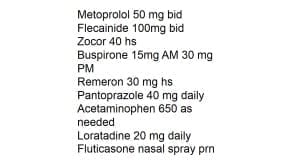Tonight’s medication list review is a bit shorter than usual – Here’s a couple things I’m going to be digging into. My goal is to get you to think critically about medication management, not necessarily give you a right or wrong answer, so these are really an educational exercise for all to benefit from. – Here’s my breakdown.
Knowing your doses is important and the obvious medication with an abnormally high dose is loratadine. Usual dosing is 10 mg daily. Given the higher dose and fluticasone order, I would suspect very substantial allergy, maybe rhinitis history. We certainly could look at scheduling fluticasone depending on current control of symptoms.
I would also suspect pretty significant anxiety/mental health issues as this patient is on both Remeron (mirtazapine) and buspirone. This could use much further investigation as well. Always important to remember the key characteristic of buspirone versus the benzodiazepines for anxiety: Buspirone generally takes a significant amount of time to start working (i.e. maybe weeks) which differs greatly from the benzo’s (like lorazepam, alprazolam etc.). Hence, you shouldn’t ever see an as needed order for buspirone, but I frequently see them for benzo’s. An obvious disadvantage is benzo’s have some sedative/confusion side effects that can be particularly troubling in the elderly. Another obvious disadvantage of benzo’s is they are a controlled substance in the US.
Vital signs like pulse and blood pressure are going to be very important with this patient being on flecainide and metoprolol.
I also can’t help but wonder about possible antiplatelet therapy like aspirin. The patient certainly could’ve had some issues with bleeding or other problems, but certainly something that should be investigated with the use of metoprolol, flecainide, and simvastatin (Zocor).
Click here for free access to a 6 page PDF on 30 medication mistakes I see in my everyday practice!




Why not review a recent EKG to see if the flecainide is being effective for the pt? if not, may have to pursue another antiarrhythmic or change treatment approach with rate control plus antithrombotic if appropriate. I’m not sure why this was not brought up, but allergic rhinitis was…